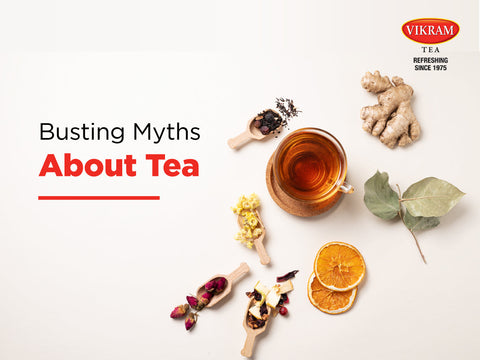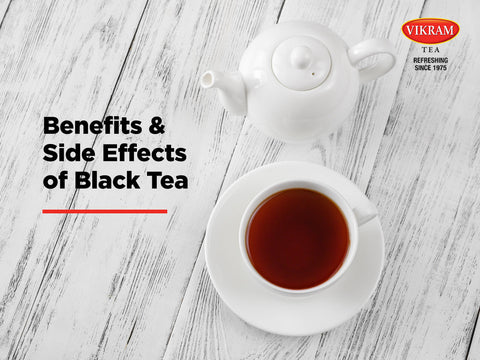Tea has always played an important role in our society, from ancient times to the present. It differs significantly from traditional beverages such as coffee, alcohol, beer, and aerated drinks. It is no surprise that there are numerous facts as well as myths about tea in the world.If you aren’t sure about the myths, we are here to your rescue!
In this blog we are going to bust some myths around tea, specifically the ones that taint tea with incorrect colours.
Myth 1: Peppermint tea is beneficial for health.
When it comes to gastrointestinal distress, such as heartburn caused by GERD, peppermint may not be the best choice. In certain cases, Turmeric tea with ginger can be better for your stomach issues. But it is also advised that you seek medical help to treat ailments that persist over a long period of time. You can try out Vikram Kavach Turmeric Heal Tea, which is filled with the richness of natural antioxidants, powerful herbs, and other ayurvedic ingredients. It has anti-inflammatory and antibacterial properties that aid in the removal of toxins from the digestive tract. It helps to reduce inflammation and stress, boosts immunity, and supports cognitive performance.
Myth 2: Green tea can transform you into a Greek god.
This is one of the most inaccurate things in circulation! Yes, green tea can help you manage your weight effectively. However, it is difficult to get into shape quickly. You need more than tea to stay in shape. Green tea improves metabolism and energy burn. Regular consumption of green tea can boost your metabolism, ensuring that you don’t have excess fat in your body. Green tea is an antioxidant-rich health drink. It is critical to understand that simply drinking green tea will not help you lose weight; you must also exercise and eat a healthy diet in addition to drinking green tea.
You can try Vikram Green Tea; it is made from Camellia Sinensis leaves and is known for its profound health benefits as it does not undergo the same oxidation process as regular black tea.
Myth 3: Dried tea leaves last forever.
Every product you purchase has a shelf life. The same is true for tea leaves. It doesn’t matter if it’s dried or roasted. Preservatives may extend the shelf life of tea leaves, but they may be harmful to your health. So, don’t keep the tea leaves for too long.
If the tea leaves have passed their expiration date and you, you can compost them and use them for house plants or in your garden!
Myth 4: Tea bags are fantastic!
There is no substitute for loose tea leaves. If you can’t resist the urge to use a tea bag, choose a bleach-free tea bag product. Tea bags are frequently filled with low-quality tea dust and are made of bleached silk or corn plastic, making them even more harmful to the environment.
However, we still recommend using loose leaf tea because it contains more healthy compounds than tea bags.
Myth 5: India is the largest tea consuming country.
Here’s the most common and everyone’s favourite tea fact. When it comes to India being the largest tea-consuming country, this is partially true and partially just a cliché. Yes, we surely do consume a whole amount of tea, but so do the United Kingdom and other countries. According to a research conducted in 2016, Turkey,with a consumption of 3.16 kg (6.96 lb) per capita,is the world’s largest tea-consuming country in annual per capita terms.
Myth 6: Adding milk to tea diminishes the tea’s health benefits.
This is a very common myth, but it is a misconception. Many studies have been conducted to find out if adding milk diminishes the health benefits of tea. We all know that milk contains calcium, which is beneficial for our bones. And in fact, in some countries, it is customary to add milk to tea. The jury is still out on whether adding milk diminishes the health benefits of tea or not.
But if you’re still unsure about adding cow’s milk, you can try adding oat milk or soy milk.
Myth 7: Tea dehydrates you.
This is clearly not the case. The first thing to mention is that tea is almost entirely liquid content, whether boiled, flavoured, or otherwise.
While tea is a diuretic, this does not imply that more water is leaving your body than is being used. While caffeine has a mild diuretic effect, the fairly low levels found in tea have little effect on hydration levels.
Myth 8: Tea consumption lowers the risk of cancer.
It would be wonderful to believe that tea is a cure for cancer. However, the facts are that while numerous studies have been conducted, most of them have focused on green tea. Despite numerous studies demonstrating a positive relationship between green tea and health, determining the beverage’s impact on the prevention of cancer remains uncertain.
Myth 9: The health advantages of tea are just the antioxidant properties.
So, we can clearly say that tea offers more healthy advantages along with it’s antioxidant properties. You can try having Vikram Gold Special Mix Tea; it contains Assam’s orthodox leaves, the stamp of quality and purity.
Myth 10: Drinking too much tea can darken your skin colour.
When you were a kid, remember how your mother would stop you from drinking tea, saying you’d turn dark if you began drinking it? Call it an excuse to keep kids away from tea, but many of us still believe that drinking tea every day makes us dark. Is this true? Well, absolutely no.
Tea has historically played a significant role in health, luxury, trade, and the economy. It is still regarded as one of the most prestigious beverages in the world. In India, there is a strong tea culture that permeates all regions. So, with this we wrap up and hope that we helped you get a clarity on which tea facts are nothing but just some myths. Share this blog with your friends and family and help them identify facts and myths around tea!
Stay tuned for more blogs and product updates.
Sources: Mfine, Tea-and-coffee, Simplelooseleaf, Everydayhealth



